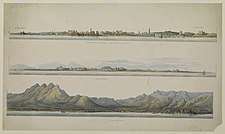Qatar Digital Library
Qatar Digital Library (QDL) is a bilingual online library which was launched as a joint venture by a partnership consisting of Qatar Foundation, Qatar National Library and the British Library in October 2014. QDL comprises one of the largest online collections of historic records on the Persian Gulf countries.[1]

History
Qatar Digital Library was first announced in 2012.[2] The starting budget was reported as £8.7 million.[3] The partnership sought to digitize a rich trove of heritage material documenting Arab and Islamic history and to make it freely accessible to the public through the QDL, which was launched online in October 2014.[4] The launch of the QDL's website marked the first phase of its launch. On 19 January 2015, the second phase of the QDL was commenced and is expected to last until December 2018. The second phase will witness the digitization of 1,125,000 pages of historical documents.[2]
The website was designed and built by Cogapp.[5] It has won multiple awards.[6][6][7]
Content
The digital library, with an English and Arabic bilingual interface, encompasses a total of 500,000 pages of items held by the British Library pertaining to the history of the Persian Gulf region. Some 475,000 pages, dating from the mid 18th century to 1951, are from the India Office Records and Private Papers (including the archives of the East India Company and its successor institutions); and 25,000 pages are of medieval Arabic scientific manuscripts.[8][9] Among the pages are numerous photographs, maps, and drawings.[10]
The British Library and QNL will both hold copies of the digital collection; however, after the completion of the digitization (originally estimated as the end of 2014), the QNL will assume responsibility for the hosting and further development of the QDL portal.[8][9]
Similar projects
- Unlocking Our Sound Heritage – UK project for digitising project for audio archival material
- Unlocking Film Heritage – UK project for digitising audiovisual archival material
- Endangered Archives Programme - British Library programme for preserving cultural heritage
- Theatre Archive Project – for British theatre history
References
- "Now, access Omani history online". Times of Oman. 21 October 2014. Retrieved 24 October 2015.
- "One million rare, historical documents to go online". Gulf Times. 19 January 2015. Retrieved 24 October 2015.
- Tom Rowley (10 October 2013). "British Library: Post-war American propaganda 'belittled' Britain". The Telegraph. Retrieved 24 October 2015.
- Claire Shaw (30 December 2014). "Making an impact in higher education: top 10 most read pieces of 2014". The Guardian. Retrieved 24 October 2015.
- Cogapp (2016-07-20). "Qatar Digital Library | Cogapp". www.cogapp.com. Retrieved 2016-12-20.
- "Qatar Digital Library | UX Awards". userexperienceawards.com. Retrieved 2016-12-20.
- "Interactive Media Awards - Winner Page". interactivemediaawards.com. Retrieved 2016-12-20.
- Nadine El-Sayed (11 November 2014). "Digitizing 1,000 years of Gulf history: The Qatar Digital Library opens up the rich history of the Gulf region to the public". Nature Middle East. Retrieved 24 October 2015.
- Matthew Teller (22 October 2014). "Tales from the India Office". BBC News Magazine. Retrieved 24 October 2015.
- "The British Library Qatar Foundation Partnership". British Library. Retrieved 24 October 2015.